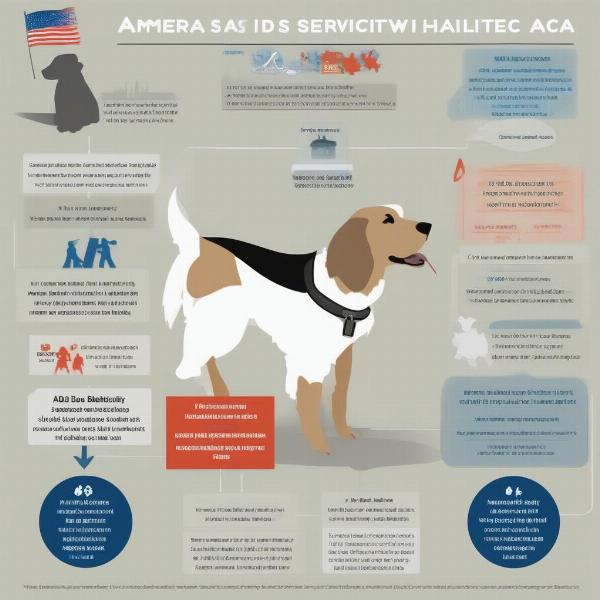Service dog training in Boston is a significant commitment, requiring patience, dedication, and the right resources. Finding a qualified trainer who understands the specific needs of service dogs is crucial for success. This guide provides you with everything you need to know about service dog training in Boston, from choosing the right program to understanding the legal aspects of having a service animal.
Choosing the Right Service Dog Training Program in Boston
Selecting a reputable training program is the first step toward a successful partnership with your service dog. Look for programs accredited by Assistance Dogs International (ADI) or other recognized organizations. These programs adhere to rigorous standards and ensure high-quality training. Consider factors such as the trainer’s experience, training methods used (positive reinforcement is highly recommended), and the program’s specialization, if any. Some programs focus on specific disabilities, so finding one that caters to your needs is essential. Don’t hesitate to ask for references and testimonials from previous clients.
Understanding the Legal Landscape for Service Dogs in Boston
 Understanding the Legal Landscape for Service Dogs in Boston
Understanding the Legal Landscape for Service Dogs in Boston
Service dogs are protected under the Americans with Disabilities Act (ADA), which grants them access to public places where pets are typically not allowed. However, it’s important to understand your rights and responsibilities as a handler. Your service dog must be well-behaved and under your control at all times. While businesses can ask if your dog is a service animal and what tasks it performs, they cannot inquire about your disability. Familiarize yourself with the ADA regulations and Massachusetts state laws regarding service animals to ensure a smooth experience in public settings. For information regarding dog licensing in Boston, check out our article on boston dog license.
Training Your Service Dog: Key Stages and Considerations
Service dog training involves several stages, from basic obedience to specialized task training. Early socialization is critical, exposing your dog to various environments, sounds, and people. Basic obedience forms the foundation for more advanced training, ensuring your dog responds reliably to commands like sit, stay, and come. Task training focuses on teaching the dog specific skills to mitigate your disability. This could include retrieving items, opening doors, providing balance support, or alerting to medical events. Consistency, positive reinforcement, and patience are key throughout the training process. If you’re considering hiring a dog sitter in Boston, be sure to inform them of your service dog’s training and specific needs. You can find helpful resources in our article on dog sitter boston.
Is Zamioculcas Zamiifolia Toxic to Dogs?
It is crucial to create a safe environment for your service dog, and that includes being mindful of potential hazards in your home. Zamioculcas zamiifolia, also known as the ZZ plant, is a popular houseplant but is unfortunately toxic to dogs. If ingested, it can cause gastrointestinal upset and other unpleasant symptoms. For more information on the toxicity of ZZ plants and other potential hazards for your canine companion, please refer to our dedicated article: zamioculcas toxic to dogs.
Conclusion
Finding the right service dog training program in Boston requires careful research and consideration of your individual needs. Remember to choose a program with qualified trainers, positive reinforcement methods, and a focus on your specific disability. Understanding the legal aspects of having a service dog and maintaining consistent training are vital for a successful partnership.
FAQ
-
How long does service dog training typically take? Service dog training can take anywhere from six months to two years, depending on the dog’s aptitude and the complexity of the tasks it needs to learn.
-
Can any breed be a service dog? While many breeds can be trained as service dogs, some are better suited than others due to their temperament and physical characteristics.
-
What is the difference between a service dog and an emotional support animal? Service dogs are specifically trained to perform tasks that mitigate a disability, while emotional support animals provide comfort and companionship.
-
Where can I find certified service dog trainers in Boston? You can find certified service dog trainers through organizations like Assistance Dogs International (ADI) or by searching online directories.
-
What are the costs associated with service dog training? The cost of service dog training can vary depending on the program and the dog’s specific needs.
-
Are there financial assistance programs available for service dog training? Several organizations offer financial assistance for service dog training. Research options online or contact local disability service agencies.
-
What should I do if I encounter access issues with my service dog? If you encounter access issues, politely explain your rights under the ADA. If the issue persists, you may contact the Department of Justice.
About ILM Dog
ILM Dog is your trusted international resource for all things dog-related. We provide expert advice and practical tips on various aspects of dog care, including breed selection, health, training, nutrition, grooming, and much more. Our commitment is to empower dog owners worldwide with the knowledge and resources they need to build strong, loving relationships with their canine companions. We also specialize in advising on suitable products and accessories for your furry friends. For any questions or further assistance, reach out to us via email at [email protected] or call us at +44 20-3965-8624.